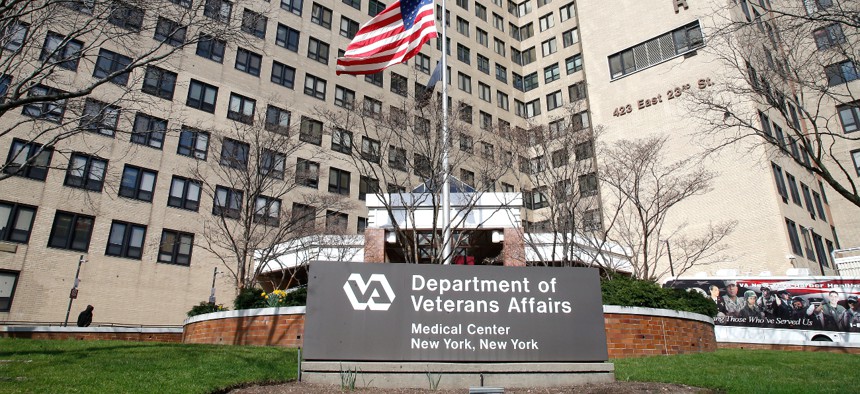
Lawmakers and the Biden administration have pushed for better pay for VA workers as a key element of their joint agenda to boost care at the department. John Lamparski/NurPhoto via Getty Images
Lawmakers Agree It's Time to Lift the $400,000 Pay Cap for VA Doctors
The Biden administration has called the pay increases a top priority.
Health care personnel at the Veterans Affairs Department could soon see significant pay bumps as part of a sweeping compensation reform put forward by two of the top senators with oversight of the agency.
VA physicians, dentists, optometrists and podiatrists would no longer face a $400,000 pay cap whenever the secretary deemed it necessary under a bipartisan bill put forward by Sens. Jon Tester, D-Mont., who chairs the Senate Veterans Affairs Committee, and John Boozman, R-Ark. The bill is designed to help VA remain competitive with the private sector and fill vacancies throughout the department as it prepares to fold a new swath of veterans into its health care network.
The VA Clinician Appreciation, Recruitment, Education, Expansion and Retention Support (CAREERS) Act would replace an “antiquated pay system” for VA’s doctors, the lawmakers said, helping the department hire for hard-to-fill positions that have particularly impacted rural facilities. It would create new awards and bonuses tied to recruit, relocation and retention. VA Secretary Denis McDonough and other officials have labeled the need to revamp its pay caps and overall compensation system as a key priority to carry out the department’s growing mission.
The measure would provide other benefits to VA employees, such as paying for licensure exam costs for those enrolled in the department’s scholarship programs and reimbursing ongoing professional education for more employees. It would also create new requirements for VA to report to Congress on its hiring and workforce data.
Tester said he made a point to focus his first veterans bill of the new Congress on helping VA address staffing shortages.
“We need VA to hire providers faster and be able to retain high-quality talent in rural areas,” Tester said, adding his bill would “ensure VA can recruit the best and brightest clinicians to help deliver veterans—including those in rural areas—their earned health care and benefits.”
VA has for years been on a quest to boost its rolls—and it has found significant success, growing its workforce by more than 100,000 employees over the last decade. Still, the department has struggled with large-scale vacancies. The issue received renewed attention after President Biden signed the Honoring Our Promise to Address Comprehensive Toxics (PACT) Act into law, which makes potentially millions of veterans newly eligible for VA benefits and care due to their service-connected exposure to burn pits.
Lawmakers and the Biden administration have pushed for better pay for VA workers as a key element of their joint agenda to boost care at the department. Passed as part of the fiscal 2022 omnibus funding package, VA has already begun implementing the Retention and Income Security Enhancement (RAISE) Act. That has led to VA approving pay increases for nearly 10,000 nurses, boosting their salaries to a new cap of $203,000 per year. Any nurse at the previous cap, or within 10% of it and working in certain markets, automatically saw a pay increase.
The department has rewarded high performers more generously after the PACT Act removed caps on bonuses and allowed for special contribution awards worth $25,000. It has increased efforts to bring on early career talent by using new expedited hiring for recent graduates and increasing student loan repayments.
As part of the annual defense authorization bill passed late last year, VA must conduct annual pay surveys at its medical centers to ensure its employees are receiving competitive compensation. VA Undersecretary for Health Shereef Elnahal said last month that raising the cap on aggregate pay for physicians, dentists and podiatrists beyond the current limit of $400,000 was a top priority. He lamented the department is losing too many employees and candidates to the private sector who offer far larger salaries, but said key lawmakers have been receptive to the proposal. Elnahal said VA was on track to implement PACT Act provisions to provide critical skill incentives, special pay rates and pay waivers in early 2023. Continuing to grow the workforce, he said, would also better enable the department to handle waves of COVID-19 cases among veterans.
Boozman said he frequently hears from veterans about provider shortages.
“Our legislation expands the VA workforce in communities nationwide and creates a sustainable pipeline, strengthening its ability to attract expert physicians,” Boozman said. Ensuring the VA is properly staffed is key to fulfilling our promise to the men and women who served in uniform.”







